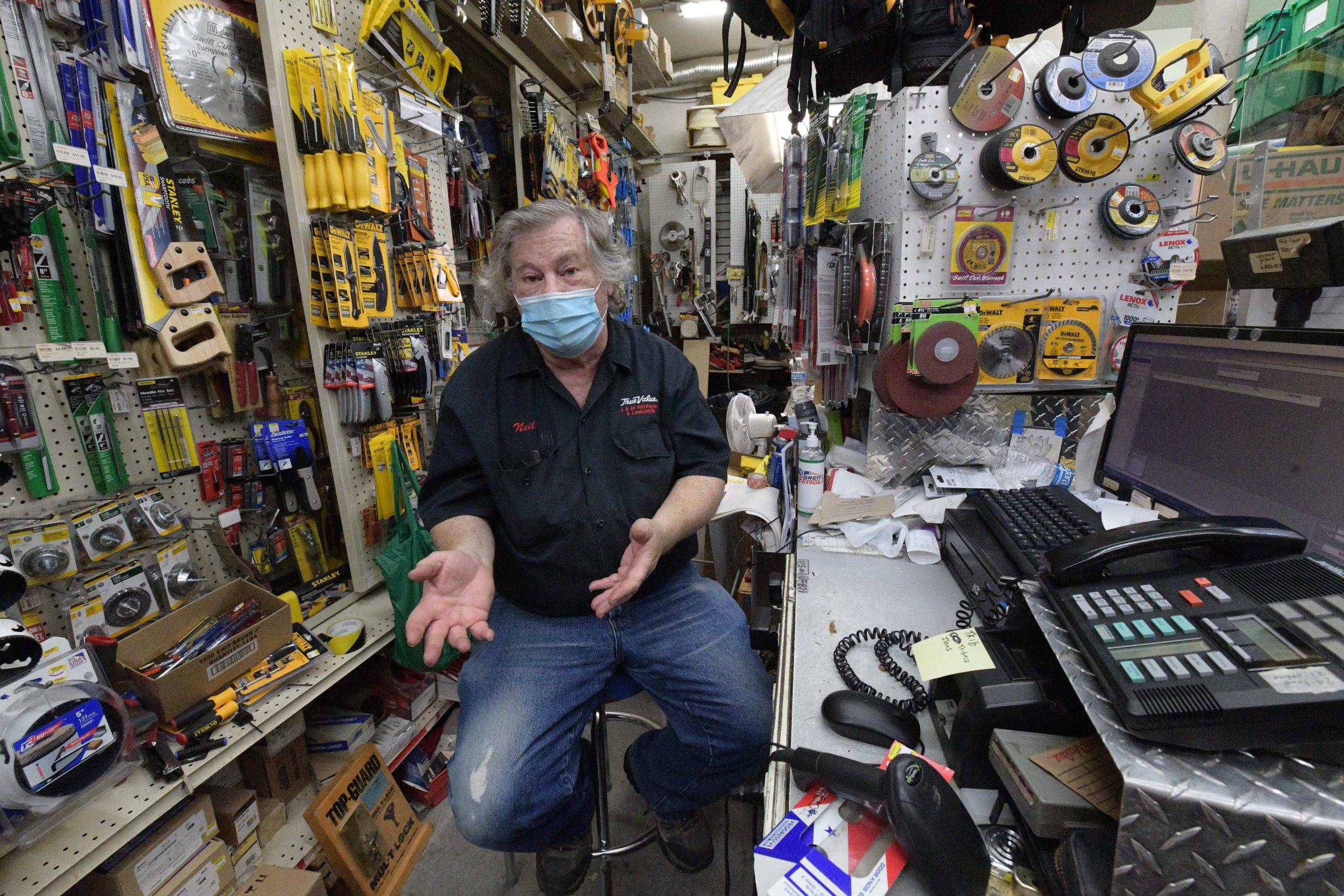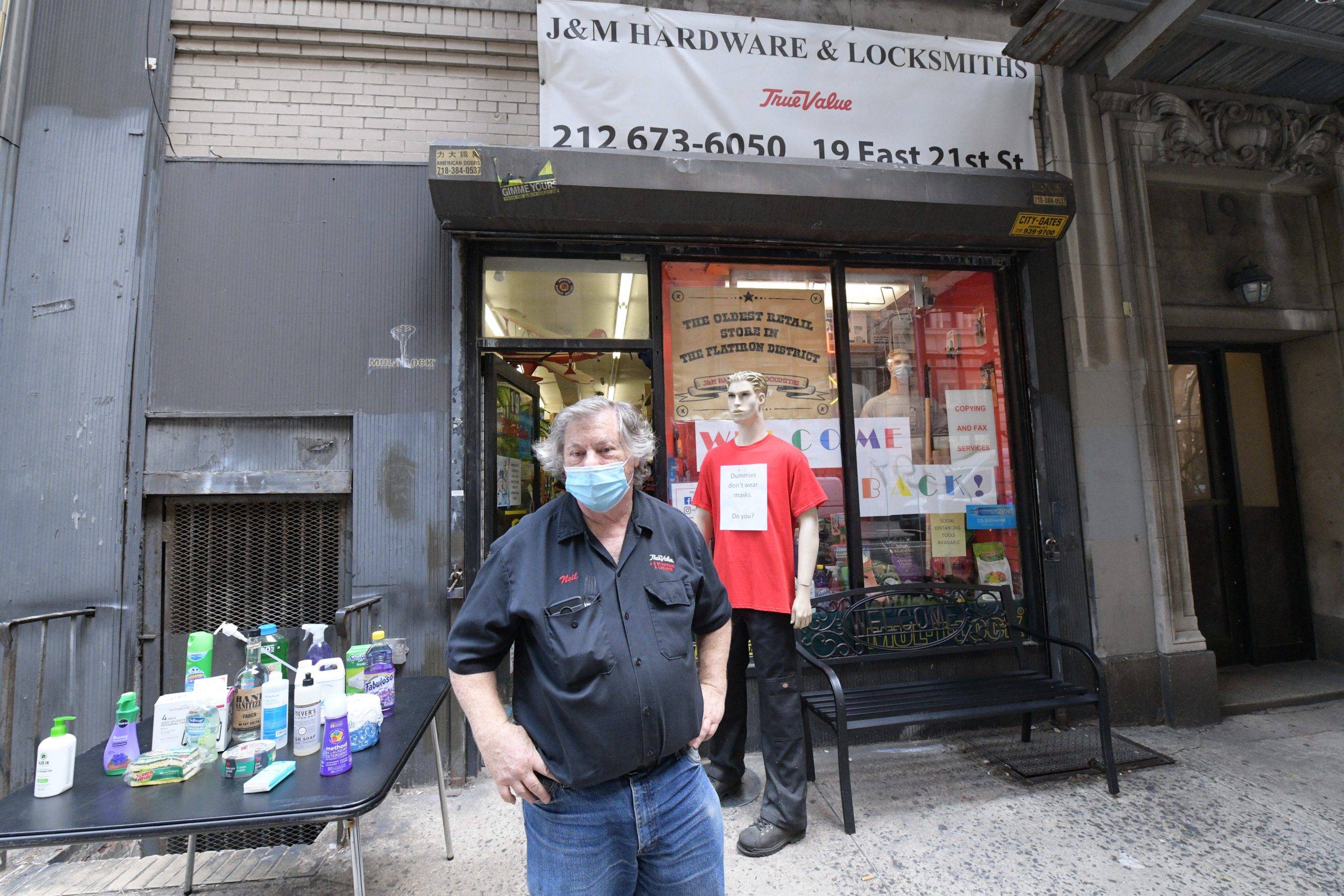Sign up for our COVID-19 newsletter to stay up-to-date on the latest coronavirus news throughout New York City

Neil Schneider, of J&M Hardware and Locksmith in Manhattan’s Flatiron District, is the quintessential mom and pop type store surviving the COVID-19 pandemic.
Even though they were allowed to remain open during the crisis as an essential business, revenues are still off by more than 50%. What’s a good barometer for assessing the situation? For Schneider, it’s all in the keys.
During the worst part of the crisis, he was making just 93 keys in a month, versus more than 1,000 normally. Street traffic is also off significantly — he points to the lack of delivery trucks on his street as an indicator.
Schneider has a rather small store on East 21st Street compared to some of the bigger names in the Flatiron District; Home Depot sits only two blocks away on West 23rd Street. But his business, founded in 1947 (the oldest running business in Flatiron) and formerly on Park Avenue, is different, as it caters to the real estate industry and commercial entities. Schneider feels their pain, too.
As his business changed overnight because of COVID-19, Schneider was able to pivot and in February, he smartly purchased two pallets of N95 masks and other PPE. It came in handy as some of his best clients scrounged for PPE where ever they could find it.
Schneider saw people around him getting sick and sometimes dying, so he started giving PPE away to medical centers, doctors who were his clients, family and friends.
“We were fortunate to have gotten, two pallets of N95 masks from 3m, and we started doling it out to people and then we stopped selling it and were giving it to doctors and nurses for free,” Schneider said as he sat in his plexiglass enclosure in the rear of his cramped store, surrounded by tools and hardware parts on the walls. “I gave to my bookkeeper Tina’s parents, I gave it to a doctor traveling to nursing homes with face shields – my sister is an oncology nurse so I helped her. I gave it to Tina’s son in law at who works at Winthrop.”
J&M never closed during the pandemic. Instead, Schneider said he is now working six days a week and has cut his own salary just to make ends meet. He secured Payroll Protection Program funding and a break from this landlord “who preferred to have an occupied store than to put them out of business.”
Today, Schneider is paying half his monthly rent, and will increase his payments as things improve.
His long-time bookkeeper, Tina Burk, who travels to the business once a week, says the business is dependent upon real estate managers, but they are hurting as businesses consider reducing their office and retail space.
“We do a lot of supplies for building maintenance and supers — that’s a big part of biz, but everyone is all scrambling,” Burk said. “People couldn’t find cleaning products and PPE, but Neil is persistent and was calling every supplier and had to get products from those he didn’t necessarily have a relationship with so he had to pay up front – all COD. When business is down 40-50% that becomes an issue. But Neil spent his life searching for what customers needed – just ask him, how many hammers, screwdrivers, light bulbs – he would know how many.”
 Neil Schneider of J&M Hardware is holding his own despite business being off by more than 5o percent in Gramercy Park. (Photo by Todd Maisel)
Neil Schneider of J&M Hardware is holding his own despite business being off by more than 5o percent in Gramercy Park. (Photo by Todd Maisel)
On top of the COVID-19 crisis, Schneider was helping clients prepare for the massive looting of stores around the neighborhood during the civil unrest.
In one case, Schneider came to the aid of Georgios of Gramercy, Burk said, running to his establishment with plywood to help him board up before the onslaught of looting and broken windows.
“There were civil protests in the area, but the looters were a small number of people with nothing to do with the protestors,” she said. “A number of placed boarded up – it looked like Beirut. Neil stays extra time to help board up a restaurant, that’s the kind of guy he is.”
Schneider said the looting added to the destruction of businesses in the city, causing more people to stay home and damage to some of the larger stores where looters were looking for merchandise like cell phone stores, Coach, and other designer shops.
“The main thing [is] we’ve been healthy – but right now, profit is not the most important thing,” said Schneider, pointing to a sign outside his store encouraging people to shop at other small businesses. “We will not make money here right now, but you can help people and that is our mission now. I hope in September, more people are here and so maybe by next year will be better and we can pay bills, get through it.”
Schneider says the federal government must step up to save the small businesses or reduce property taxes. Without it, he fears most restaurants and small businesses will die.
But despite the doom and gloom, he is confident that New York City will not only survive, but will have a resurgence.
“New York will come back though I don’t think commercial business will come back anywhere where it was,” he sighed. “People are working from home. But people will always want to live here – museums are starting to open up a bit – once the movies and theaters come back an the schools open up, (why NYU is opening is beyond me), people will want to live here and I don’t know whats going to happen with some, but the city – it always comes back.”
 Neil Schneider of J&M Hardware is holding his own despite business being off by more than 5o percent. (Photo by Todd Maisel)
Neil Schneider of J&M Hardware is holding his own despite business being off by more than 5o percent. (Photo by Todd Maisel)
This story is part of amNewYork Metro’s “Small Business Survivors” series, an ongoing look at how New York City small businesses are working to recover from the COVID-19 pandemic. If you’re a small business owner surviving the pandemic.